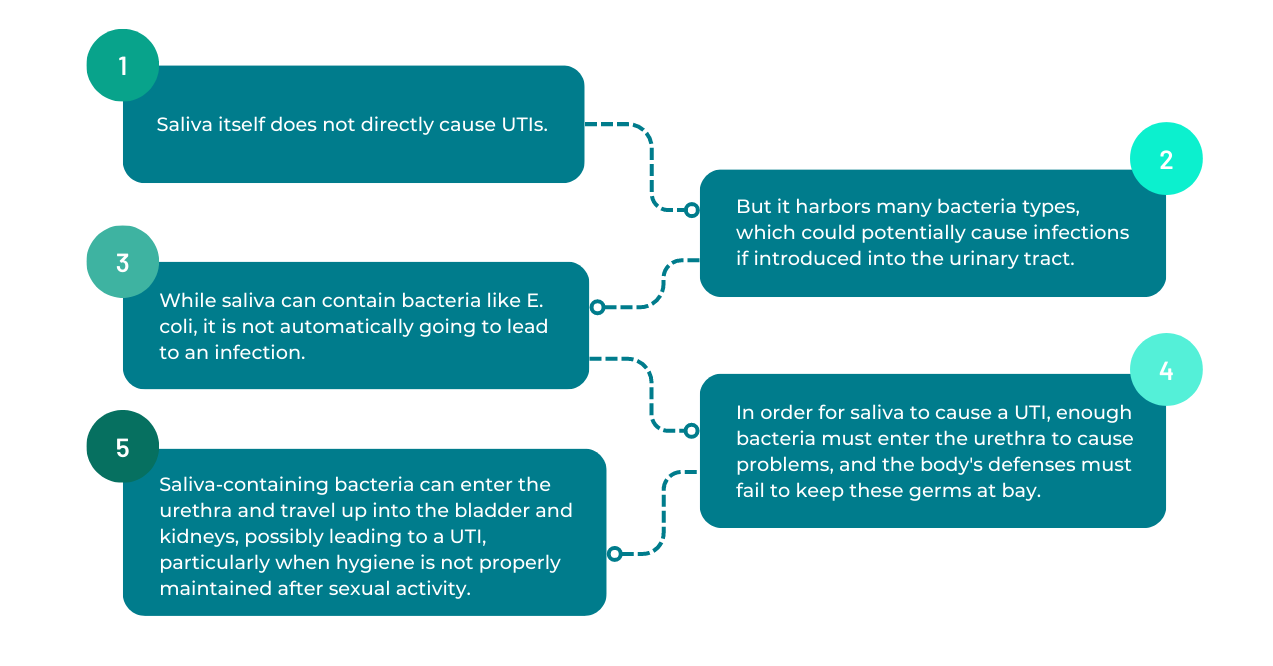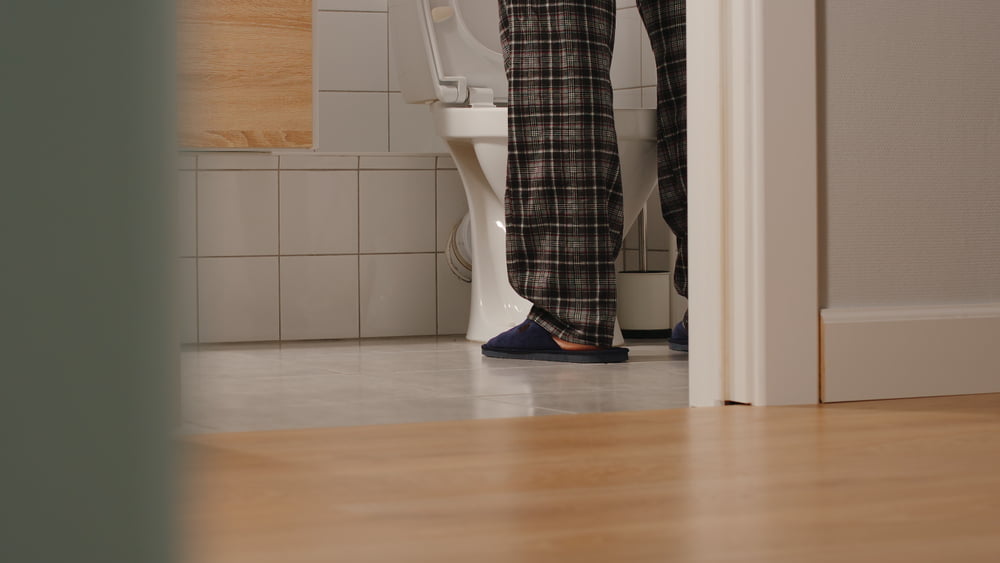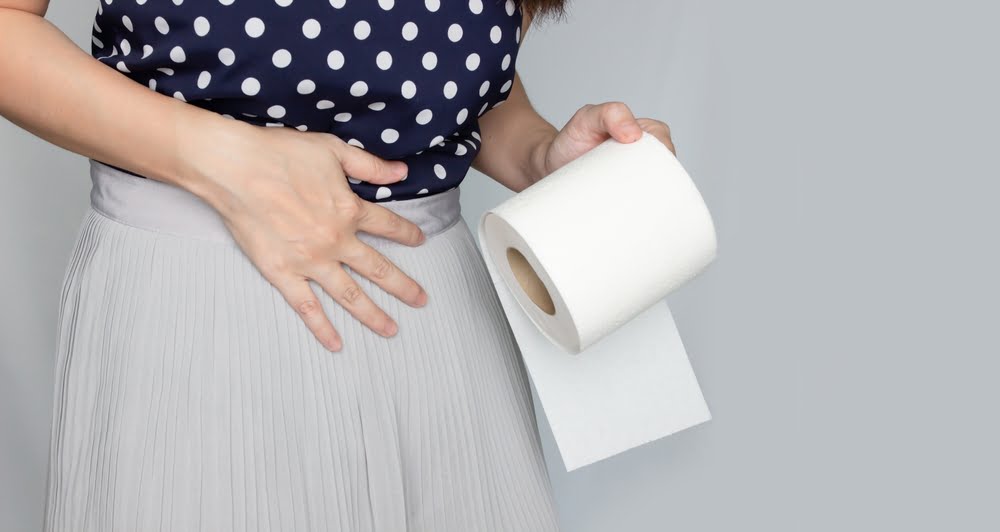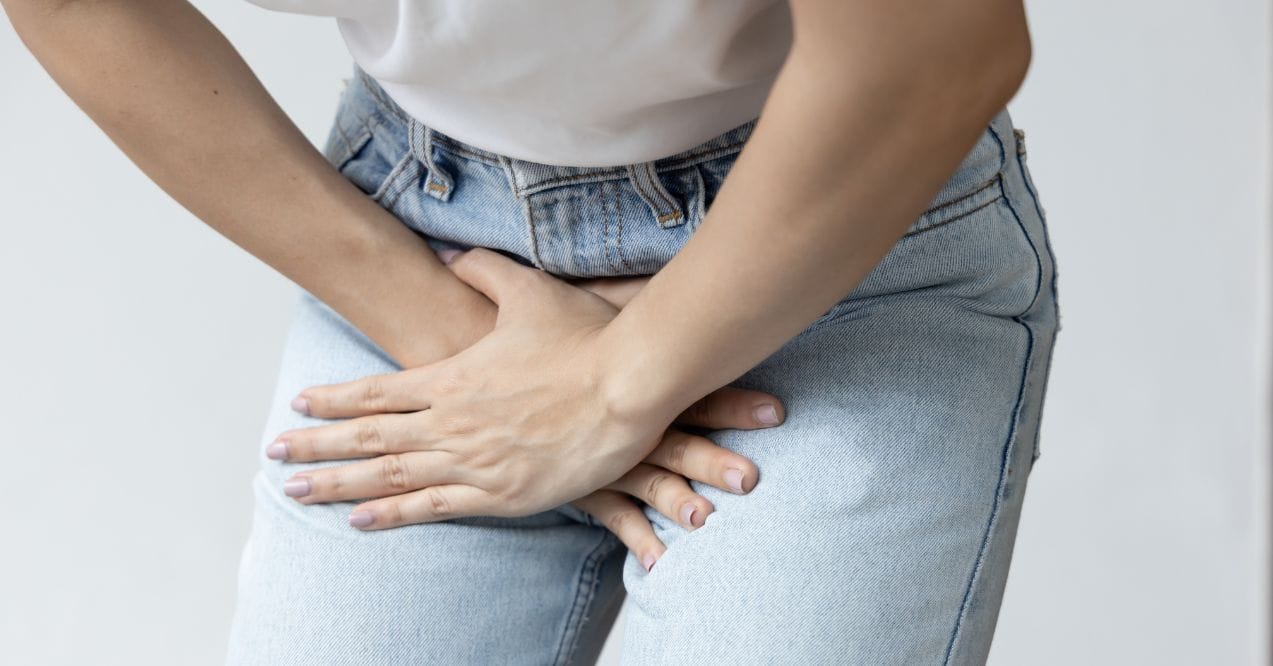Can Saliva Cause UTI?
Can saliva cause UTI? Uncover the truth about saliva's role in urinary tract infections and how to prevent them effectively.


Many still wonder can saliva cause UTI. Recent studies suggest it’s possible, as saliva can carry bacteria that may enter the urinary tract, potentially causing infections. Interestingly, your saliva naturally hosts over 700 types of bacteria, which usually contribute to oral health.
However, when saliva comes in contact with the urinary tract, those same bacteria can wreak havoc. After kissing, oral sex, or self-contamination, saliva-containing bacteria can access the urethra and travel upwards into the bladder and kidneys. Conditions are especially ripe for bacteria when the genital area is not cleaned adequately after these activities and before urinating.
If left untreated, saliva-transmitted bacteria in the urinary tract can multiply rapidly and cause infections that range from irritating to damaging and dangerous. Read on as we take a closer look at how saliva interacts with the urinary tract and what you can do to prevent saliva-borne UTIs.
Delving Deeper Into UTIs
Urinary tract infections plague millions, especially women. An estimated 50% to 60% of females develop at least one UTI during their lifetimes compared to only about 12% of males. Females suffer more thanks to anatomical distinctions. Their shorter urethras permit easier movement of bacteria into bladders.

The more sexual partners women have, the greater the chances of UTIs since sex introduces new bacteria. Symptoms include urgent and frequent urination, painful urination, and constant pressure in the lower abdomen. Untreated, UTIs can spread to kidneys and cause severe issues.
What Is a UTI?
A UTI happens when bacteria like E. coli invade your urinary tract. It can include your kidneys, ureters, bladder, and urethra. Most UTIs start in your bladder from bacteria entering your urethra. UTIs range from minor annoyances to serious infections. Mild ones cause burning and frequent peeing. Unless treated, severe UTIs can spread to your kidneys, damaging them permanently.
Symptoms of UTI
UTI symptoms can vary depending on which part of your urinary tract is infected. Some common symptoms of a bladder infection or UTI include:
- Needing to urgently pee every few minutes, even when only a little comes out
- Feeling a stinging or burning sensation when you pee
- Urine that looks cloudy, milky, or has a strong ammonia smell
- Extreme fatigue and weakness
- Discomfort or sharp pains in your bladder or lower abdomen
- Pain that worsens at the start of urination then lessens afterward
- Urine with blood or an unusual color like pink or cola brown
- Fever, chills, and muscle aches
- Nausea or vomiting
- Back pain above either hip bone
- In men, frequent urges to pee but producing little urine
- Men may also experience rectal pain or no symptoms
What Causes UTI?
Your urinary tract starts going rogue when bacteria sneak into your bladder and begin spreading. That’s when a urinary tract infection, or UTI for short, strikes. The symptoms are hard to miss — itchy, burning pain when peeing, and excessive trips to the bathroom. Cloudy, smelly urine is a telltale sign too. Sometimes you’ll also feel cramps or pain in your lower abdomen or back.
But how do bacteria even get in there? The opening of your urethra where pee comes out makes a convenient entrance point. All it takes is a few hitchhiking germs to crawl up and invade your bladder. Women are far more prone to UTIs due to their anatomy. Their urethras are shorter, giving bacteria a straight shot into the bladder. Once inside, the bacteria stick to the urethra’s wall and multiply rapidly, setting off the annoying symptoms and can spread to the bladder and kidneys.
Poor hygiene after using the restroom can leave bacteria lingering around the urethral opening, ready to invade. Not peeing right after sex can also shove bacteria up into your bladder. Health issues like impaired blood sugar, kidney stones, and specific congenital disabilities may make your urinary tract more susceptible. Even catheter use, which provides a highway for bacteria, raises your risk.
Understanding why UTIs happen empowers you to take action — maintain good hygiene, urinate after sex, treat health issues, and avoid catheters when possible. Catching a UTI early by recognizing the symptoms mentioned here means you can nip it in the bud with the right treatment.
How Are UTIs Transmitted?
Transmission of UTIs can happen in several ways. Sexual contact is a major frequent source of urinary tract infections, as bacteria may enter the urethra during intercourse. Not washing your hands properly after using the bathroom or otherwise having inadequate personal hygiene can result in bacteria causing an infection. Improper wiping after a bowel movement can push fecal bacteria into the urethra, particularly in women. Holding urine for extended periods of time allows bacteria to replicate and ascend into the urinary tract, increasing UTI risk.
Preventive strategies include thorough handwashing, proper perineal cleaning, and wiping front to back after using the toilet. Urination after intercourse flushes out bacteria that may have made their way in. Drinking sufficient fluids helps maintain urine dilution, impeding bacterial growth. Cranberry juice or supplements for women’s health can potentially reduce UTI recurrence according to clinical trials.
Prompt medical evaluation is the route to follow for new or recurrent UTIs. A urine culture test can determine antibiotic susceptibility of the bacterial strain causing infection. Untreated UTIs may spread to the kidneys, progressing to pyelonephritis which requires hospitalization in severe cases.
Saliva Composition and Function
Saliva serves numerous important bodily functions but does not directly cause urinary tract infections. It contains water, enzymes, mucus, and cells that help with digestion and oral health maintenance. When people eat, saliva coats and moistens foods, making it easier to mechanically break down bits of food. It also contains digestive enzymes like salivary amylase, which breaks down carbohydrates early in the digestive process.
However, saliva that enters the gastric juices in the stomach become dormant in the acidity and reanimate once they reach a higher pH area in the intestine. Saliva cleans and lubricates the mouth by washing away bacteria, food particles, and other debris. The mucus in saliva helps keep the tissues in the mouth moist. This lubricating function prevents friction damage and infection that could otherwise occur regularly in the mouth.
Can saliva cause bacterial infections? Despite preconceived notions, saliva itself is actually highly sanitary and contains compounds that inhibit the growth of harmful bacteria. Saliva also contains immunoglobulins and antibacterial substances like lysozyme, which help fight infection in the mouth. It plays essential roles in digestion and oral hygiene. Saliva is generally clean and contains antimicrobial agents. However, it isn’t supposed to pass through the urinary tract. Bacteria that enter the urethra from other sources can cause UTIs.
Can Saliva Cause UTI? What Studies Show

Really, can saliva cause UTI? Many anecdotes from people claim that it does. But the short answer is no. The belief is that traces of saliva left on the urethra after oral sex can lead to infections. While backwash and spit can contain germs that may cause UTIs, research suggests the connection is not as simple as tongue-to-tube. UTIs occur when bacteria go inside the urinary tract through the urethra and start to reproduce, irritating the urinary tract lining. Germs like E. coli are common culprits.
While saliva can contain bacteria like E. coli, simply coming into contact with saliva does not automatically lead to an infection. For saliva to cause a UTI, two conditions must occur. First, enough bacteria must enter the urethra to create problems. Second, the body’s defenses must fail at keeping those germs at bay. Likely, saliva on its own is not concentrated enough with harmful bacteria to overwhelm your bladder’s protective mechanisms.
Factors beyond saliva play a much bigger role. Having sex at all increases UTI risks, not just oral sex. Other risks include having multiple partners, poor cleaning habits, hormonal changes, infections elsewhere in the body, and certain medical conditions.
Can saliva cause a UTI? While saliva alone probably does not directly cause UTIs, the activity surrounding oral sex may heighten risks. Prolonged contact time with saliva during sex could potentially allow more germs in. But sexual practices are complex, and infections are multifactorial, meaning many things likely contribute.
Effects of Saliva on the Urethra
If you’re wondering if you can get a UTI from saliva, consider the following. The urethra is a small tube that transports urine from the bladder to the outside of the body. It travels through the penis in males and the pelvic region in females. The walls of the urethra consist of epithelial and muscle tissue, mucus glands, and blood vessels that nourish and protect it. Saliva contains substances like enzymes, mucus, and antibodies that help keep the mouth clean and fight infection.
However, when saliva makes contact with the delicate urethra, it can lead to irritation, inflammation, and possible damage. Saliva enzymes can break down urethral tissue and threaten its protective mucus layer.
The bacteria in saliva can also seed infections within the urethra. Even temporary contact with saliva may activate the urethra’s immune response, causing redness, swelling, and discomfort that can persist for days. Over time, these reactions to saliva exposure may result in more serious urethral conditions like inflammation, blockage, and UTIs requiring medical treatments.
Effects of Saliva on the Bladder
The bladder is an anatomical part of the urinary system that stores urine. Physiologically, it holds urine expelled from the kidneys until it is convenient to expel it through urination. The bladder encompasses layers of muscles that contract to expel urine through the urethra. Since the bladder is part of the urinary system, saliva could potentially interact with it. But can saliva cause UTI?
Any saliva accidentally traveling down the urethra could mix with urine already collected in the bladder. While limited research exists, studies show saliva contains substances like enzymes, hormones, and electrolytes that could potentially impact cells lining the inside of the bladder. Once mixed with the urine, these saliva components may change the chemical composition or acidity, which could irritate the bladder lining.
Infections Caused by Saliva
Human saliva contains a wide range of bacteria that can transmit infections to others under certain circumstances. The most common saliva-borne infections are colds and flu, which spread through coughing, sneezing, or sharing utensils and items that have already gone through the mouth. Salivary contact transmits the viruses that cause these respiratory illnesses.
Mononucleosis is another major infection spread through saliva, commonly called the “kissing disease.” The Epstein-Barr virus that causes mono is present in the saliva of an infected person and easily transmitted through kissing, sharing drinks, or cigarettes. In very young children, hand-to-mouth contact can also pass the virus.
Dental infections like tooth decay, gingivitis, and periodontitis also occur through contact with saliva-borne bacteria. Plaque bacteria, mainly streptococcus mutans, feed on food debris and produce acids that damage tooth enamel, causing cavities. The same bacteria infect gum tissues and can progress to periodontal disease if not controlled. Rarer but serious infections transmitted by human bites involve saliva contamination of open wounds with bacteria like staphylococcus, streptococcus, and eikenella.
Prevention and Management of UTIs
Urinary tract infections, or UTIs, are all too common and can cause miserable irritating symptoms for weeks if left untreated. Whether the ailment is a mild bladder infection or spreads further up the urinary tract, UTIs can interfere significantly with your daily life and activities.
Thankfully, you can take effective measures to reduce the chances of UTI occurrence and manage symptoms when they do arise. Following good hygiene practices and simple lifestyle tweaks can lower your infection chance, and basic home remedies may temporarily relieve some discomfort while waiting for antibiotics to take full effect.
Here are some strategies to implement that can help keep UTIs at bay so you can return to feeling like yourself again sooner.
5 Best UTI Preventions
Protecting yourself from urinary tract infections requires sensible everyday habits. Implementing simple changes to your routine can prevent uncomfortable UTIs:
1. Drink Plenty of Fluids

Staying hydrated flushes bacteria from your urinary tract. Aim for 8-10 glasses of water daily and non-caffeinated beverages like herbal tea. Carry a reusable bottle to drink regularly throughout the day. Making water your default drink considerably increases intake. Staying even mildly dehydrated compromises your body’s ability to flush bacteria, and many people wonder: can dehydration cause UTI? While dehydration alone doesn’t directly cause infection, it can contribute by reducing urinary flow, making it harder for your body to clear out harmful bacteria.
2. Urinate Regularly

Avoid holding urine to prevent bacteria from multiplying in your bladder. Go whenever you first feel the urge before bacteria take hold. Frequent urination flushes bacteria from your tract more consistently. Urinate after sex. Holding urine even a few extra hours gives bacteria time to reproduce and invade tissue.
3. Avoid Irritating Feminine Products

Switch to fragrance-free, dye-free toilet paper, wipes and pads. Chemicals, dyes, and fragrances in these products irritate sensitive urethral tissue, letting bacteria attach and invade more easily. Plant-based, hypoallergenic options are the least irritating. Chemicals tend to be suspected of causing recurrent UTIs due to urethral inflammation and disruption of healthy bacteria.
4. Have a Good Bathroom Hygiene

Practice daily toilet hygiene. Wipe front to back to avoid transferring anus bacteria to your urethra. Disinfect toilet seats, sinks, and counters with antibacterial wipes or spray. Wash hands carefully with soap and water before and after using the bathroom. Poor bathroom hygiene introduces high levels of bacteria to your hands that you can transfer to your vulva or urethra, causing a UTI.
5. Wear Breathable Underwear

Choose 100% cotton underwear that allows airflow to your genitals. Synthetics like nylon trap moisture against the skin, creating a warm environment where bacteria thrive. Avoid tight-fitting pants and leggings as well. Looser, breathable cotton fabric promotes evaporation and dryness, denying bacteria a welcoming environment.
UTI Treatments
Urinary tract infections are uncomfortable and sometimes even dangerous if not taken seriously. Symptoms like frequent and urgent urination, painful urination, and painful pressure in the lower abdomen indicate a potential infection that requires treatment. UTI treatments mainly aim to alleviate symptoms and eliminate the bacteria causing the infection through medication, home remedies, and lifestyle changes.
Here are some of the most common treatments for UTI infections:
Heating Pads
A heating pad pressed against your abdomen can help provide relief from the aches, cramps, and back pain caused by a UTI. The warmth and comfort from a heating pad can relax your tensed muscles, easing discomfort and helping you get some much-needed rest and sleep. Start with a low heat setting and only use the heating pad for about 20 minutes at a time.
Antibiotics
When the symptoms of a UTI become bothersome, antibiotics are usually the first-line treatment your doctor will recommend. Common antibiotics for UTIs include trimethoprim, nitrofurantoin, and cephalexin. The medication will help kill the bacteria causing your symptoms and infection. While antibiotics generally work well and provide relief within a few days, taking the full course of medication as prescribed is important to eliminate the infection.
Pain Relievers
Over-the-counter medications like acetaminophen and ibuprofen help manage UTI symptoms, including pain or discomfort during urination, lower abdominal pressure, and backache. Stick with the recommended dosing on the bottle, and avoid exceeding the maximum amount in 24 hours. If your pain is not manageable with OTC medications, speak with your doctor about a prescription-strength option.
Cranberry Products
Cranberry juice, tablets, and capsules provide a natural route to help manage and potentially prevent UTIs. The abundant proanthocyanidins in cranberries stop bacteria from attaching to your urinary tract’s walls. While cranberry products alone won’t eliminate an active UTI, they can be a complementary remedy to help shorten symptoms’ duration and reduce the severity.
Vaginal Estrogen Therapy
If UTIs become chronic and recurrent, especially for postmenopausal women, your doctor may recommend a low-dose estrogen cream. Vaginal estrogen therapy can help restore normal estrogen levels that decline after menopause, thinning vaginal tissue and upsetting the vagina’s normal balance of bacteria. In many cases, vaginal estrogen therapy leads to fewer UTIs over 3 to 6 months of use.
Final Thoughts
So, can saliva cause UTI? While some studies indicate saliva can sometimes cause urinary tract infections, many health experts argue the claims are rare. However, intense saliva exposure can certainly be a major cause.
UTIs are common and occur for a multitude of reasons, from not drinking enough water to having poor personal hygiene. But humans are resilient, and most UTIs are manageable and can be remedied with the proper precautions and treatments.
Practice good hygiene, stay hydrated, and see your doctor at the first sign of an infection. Remember, our bodies are beautiful, miraculous things that can overcome so much more than we give them credit for. With care and perseverance, we’ll solve these mysteries and thrive.
If spit containing harmful bacteria comes into contact with the urinary tract, there’s a potential for infection. Always ensure cleanliness and avoid practices that might introduce oral bacteria to the urinary system.
UTIs primarily affect the urinary system, so symptoms in the mouth would be unusual. However, if you’re referring to infections caused by similar bacteria, symptoms might include sore throat, swollen glands, or mouth sores. If you suspect an infection, consult a healthcare professional.
While saliva has antibacterial properties and plays a role in maintaining oral health, it can also contain harmful bacteria. If these bacteria are introduced to other parts of the body, they can potentially cause infections. It’s crucial to be aware of hygiene practices to minimize risks.
Sign up for our Healthy Living newsletter!
Advertisement. This site offers health, wellness, fitness and nutritional information and is designed for educational purposes only. You should not rely on this information as a substitute for, nor does it replace, professional medical advice, diagnosis, or treatment. If you have any concerns or questions about your health, you should always consult with a physician or other health-care professional. Do not disregard, avoid or delay obtaining medical or health related advice from your health-care professional because of something you may have read on this site. The use of any information provided on this site is solely at your own risk.










